No one saves us in this world, but people give us the tools so that we can transform towards our own rescue
Personal Digressions: Some thoughts on the masks we hide behind, on truth, and the point of fiction
In a 2022 interview with the Louisiana Channel, a non-profit website based at the Louisiana Museum of Modern Art in Denmark, poet and author Ocean Vuong says, “I think no one saves us in this world, but people give us the tools so that we can transform towards our own rescue. And I think that is true of poems. We write them, and they're good enough, and then we let them go. Part of the act of writing is abandonment.”
I often wonder how much of myself I should reveal in my writing. Should I exist in my essays, or should my essays exist entirely outside of me? When I write, I think more of me bleeds into my fiction than my non-fiction. In that sense, fiction seems truer than non-fiction.
Lately, I’ve been reading Siddhartha Mukherjee’s book The Song of the Cell. He talks about how each human consists of trillions of cells—37 trillion cells, by an estimate. Each cell has its own structure, its boundary, and its function. Yet each cell exists in a community—a neighborhood—of other cells. Each cell has its own identity—its phenotype—that’s partially defined by its genes and proteins but also its location within that community. Each cell exists alone yet also exists in a network of all the other cells. It has its own identity, yet it can’t quite exist without the other cells in its community.
It doesn’t seem like a stretch to extend this fact of cell biology as a metaphor to the macro level—human beings and our communities.
Much like the single cells that we are comprised of, we humans also behave in a similar way. We have our own structure and function and boundaries, yet we exist within a community—different levels of community even—a hierarchy of neighborhoods, much like single cells. I am a person, and I exist within my neighborhood—physically—then I exist within my family and my friend circle and my work circle, within my religion, within my country, within this planet and this species.
I exist on a time scale within the context of my history, the history of my ancestors, and the history of humanity.
If I am a single minuscule entity within this hierarchical context, how much of me exists within me? When I say “I,” who am I referring to? What percentage of me is actually me?
We are all creations of our contexts. And yet, unsure of my own existence within me, I fear revealing that minuscule part of me to you.
Fiction seems to provide a mask, a pseudo reality, in which the facts might be twisted and hallucinatory, but the emotions might not.
I hide behind that mask and watch you watch me as I reveal myself to you—a stranger. I suppose that is what all writers do. That is what all artists do.
I am most honest, most myself, in my fake stories, in my fiction. In fiction, I am lying, of course. Everything is a creation of my imagination—neurons firing in my brain, conducting their sole purpose coded in their DNA. Yet, it is where I am most honest. I’m wearing a mask that shows you my real identity. And even when I try to hide, my being permeates through the matter of my words.
“Wasn’t it great back when a writer said ‘I’ and you knew they were lying?”—Benjamín Labatut
It isn’t a matter of some unrelenting need for self-expression. It is out of a sense of sacredness that writing and art contain; there exists some sort of untold vow between the writer and the writing.
Often, I think, what is the point of writing anyway?
Every time I write something, or make an attempt at it, there is a part of me that constantly questions the entire exercise. It seems like an exercise in futility. In effect, my brain then is working on two problems simultaneously: One that of the writing itself and the other of justifying the mere act of writing—not the quality of it but the reason for its existence. The same thing is happening right now as I finish this sentence.
I can’t justify it, not yet. I don’t have the words for it. Yet, I write. Yet, I lie. Yet, I reveal myself and hide myself. I abandon myself.
I am reminded of John Greene’s essay Auld Lang Syne in his book The Anthropocene Reviewed: “And between now and then, we are here because we’re here because we’re here because we’re here.” I repeat the same mantra in my head as I piece together haphazard sentences.
Is it a tool, writing? Is that what this is about? Is this whole enterprise a mere attempt at saving myself? Poetry, music, paintings, books, and everything else, every attempt made by someone to say something—are we all simply building tools of survival that we share among ourselves? Do I write to give myself the tools to survive? Is it a form of therapy to save us from the demons that live in all our heads?
Maybe.
In this essay—is this an essay?—there is a lot of me. So many “I”s. It is not fiction, as you can tell.
And so I must confess—everything I have written so far, everything you have read here, is a lie. And I’m just watching you trying to watch me as I hide behind my many masks, existing within the context of my confines.
*All illustrations from Down-Adown-Derry by Walter De La Mare (Illustrations by Dorothy P. Lathrop) [Internet Archive]

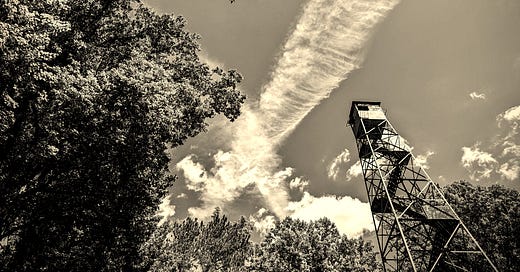



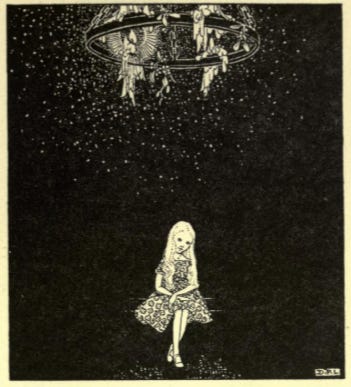
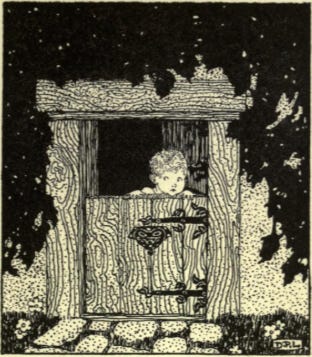
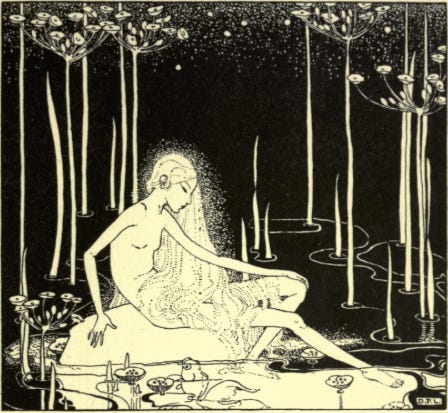
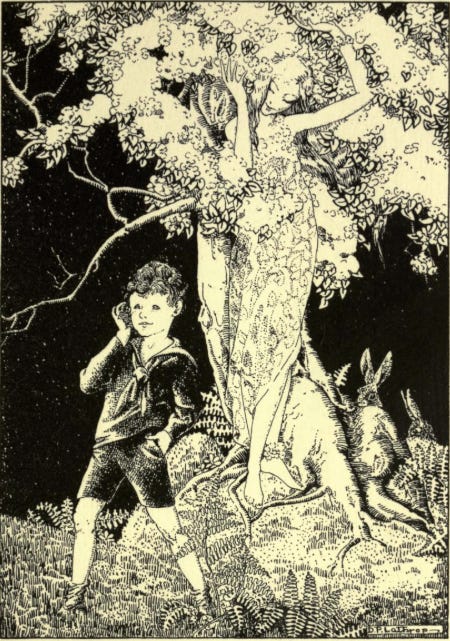
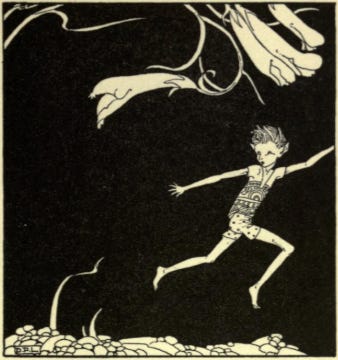
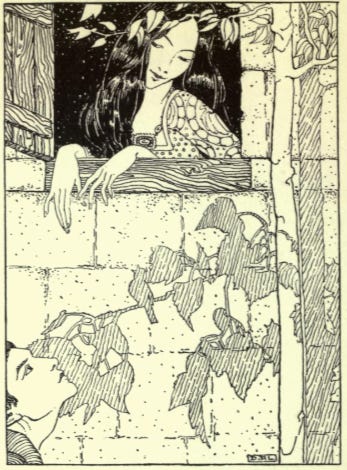
Please never stop writing it is so poetic and beautiful. I can relate so much when you said that you revealed more of yourself in fiction than non fiction. I feel the same in my paintings, they reveal parts of me and what I am longing for , more than any self portrait I tried. There is something about the safety of the abstract. But even in painting the color we chose, the composition each reveal something unspoken about ourselves and feelings in that moment while painting it.
This is what I mean when I say, "I'm not a real writer." I don't consider any of this. Your relationship with writing is so complex in ways I simply cannot grasp. So it was really interesting to read your perspective on your own skill and motivations.